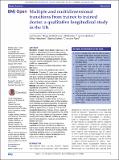Multiple and multidimensional transitions from trainee to trained doctor : a qualitative longitudinal study in the UK
Date
02/12/2017Metadata
Show full item recordAbstract
Objectives : To explore trainee doctors’ experiences of the transition to trained doctor, we answer three questions: (1) What multiple and multidimensional transitions (MMTs) are experienced as participants move from trainee to trained doctor? (2) What facilitates and hinders doctors’ successful transition experiences? (3) What is the impact of MMTs on trained doctors? Design : A qualitative longitudinal study underpinned by MMT theory. Setting : Four training areas (health boards) in the UK. Participants 20 doctors, 19 higher-stage trainees within 6 months of completing their postgraduate training and 1 staff grade, associate specialist or specialty doctor, were recruited to the 9-month longitudinal audio-diary (LAD) study. All completed an entrance interview, 18 completed LADs and 18 completed exit interviews. Methods : Data were analysed cross-sectionally and longitudinally using thematic Framework Analysis. Results : Participants experienced a multiplicity of expected and unexpected, positive and negative work-related transitions (eg, new roles) and home-related transitions (eg, moving home) during their trainee–trained doctor transition. Factors facilitating or inhibiting successful transitions were identified at various levels: individual (eg, living arrangements), interpersonal (eg, presence of supportive relationships), systemic (eg, mentoring opportunities) and macro (eg, the curriculum provided by Medical Royal Colleges). Various impacts of transitions were also identified at each of these four levels: individual (eg, stress), interpersonal (eg, trainees’ children spending more time in childcare), systemic (eg, spending less time with patients) and macro (eg, delayed start in trainees’ new roles). Conclusions : Priority should be given to developing supportive relationships (both formal and informal) to help trainees transition into their trained doctor roles, as well as providing more opportunities for learning. Further longitudinal qualitative research is now needed with a longer study duration to explore transition journeys for several years into the trained doctor role.
Citation
Gordon , L J , Jindal-Snape , D , Morrison , J , Muldoon , J , Needham , G , Siebert , S & Rees , C E 2017 , ' Multiple and multidimensional transitions from trainee to trained doctor : a qualitative longitudinal study in the UK ' , BMJ Open , vol. 7 , no. 11 , e018583 . https://doi.org/10.1136/bmjopen-2017-018583
Publication
BMJ Open
Status
Peer reviewed
ISSN
2044-6055Type
Journal article
Description
This project was funded by NHS Education for Scotland (NES) through the Scottish Medical Education Research Consortium (SMERC).Collections
Items in the St Andrews Research Repository are protected by copyright, with all rights reserved, unless otherwise indicated.

